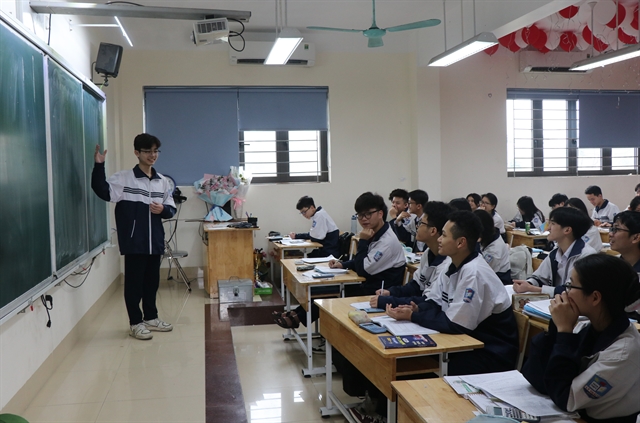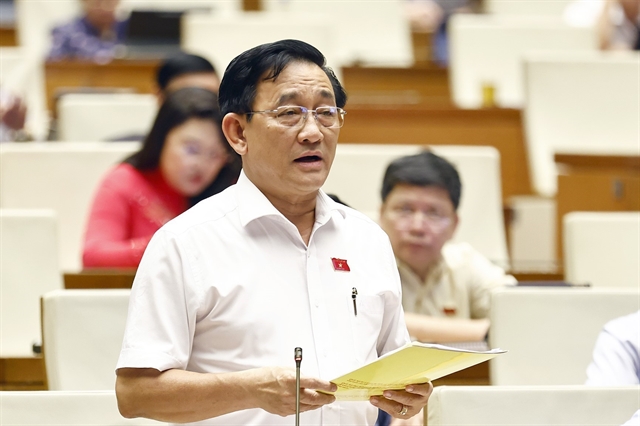 Society
Society

 |
| Students during an English lesson at Lý Thái Tổ High School in the northern province of Bắc Ninh. — VNA/VNS Photo Thanh Thương |
HÀ NỘI — Making English the second language in schools is one of Việt Nam’s strategies to revamp the country’s education and training — but experts say that this goal requires taking English beyond the classroom and creating opportunities for students to use the language in real-life situations.
One of their proposals is to change the way students are assessed in an appropriate and engaging manner, focusing on listening, speaking, reading and writing skills.
On August 12, 2024, the Politburo issued Conclusion No 91-KL/TW, which focuses on continuing the Party’s direction to improve the country’s education and training in the modern context.
A key point in the Politburo’s document is “improving the foreign language proficiency of students, gradually making English the second language in schools.”
The Ministry of Education and Training (MoET) is also developing a national project to make English the second language at educational institutions for the 2025-2035 period.
Speaking to Voice of Vietnam (VOV), Director General of the Vietnam National Institute of Educational Sciences (VNIES) Professor Dr Lê Anh Vinh said that enhancing students’ foreign language skills is not only a mission of the education sector but also a crucial strategy to promote the country’s sustainable development.
In particular, using a foreign language as a medium of instruction in different subjects is expected to improve educational quality and help students develop multi-dimensional, flexible thinking and adaptability to new challenges.
Vinh noted that this is a challenging task that cannot be accomplished overnight, but requires a clear and specific roadmap.
Each educational institution should develop its own plan to integrate English into its curriculum, making English one of the languages used in teaching and eventually establishing it as a second language.
Dr Nguyễn Thị Minh Loan, head of the English Department at the School of Foreign Languages at Thái Nguyên University, pointed out several current challenges in English language teaching, such as a shortage of qualified teachers, especially those capable of teaching at higher proficiency levels.
Facilities and teaching materials remain inadequate, and the lack of consistency in teaching methods and lesson planning has led to unequal access to English education across schools and regions, she noted.
To address these issues and make English a second language on campus, she stressed the need to invest in high-quality teaching staff, particularly those capable of teaching other subjects in English. Consistent lesson planning is also necessary to meet the requirements of each educational level, and align with the practical needs of the students.
English communication skills should be a priority from the earliest grades, integrating language learning with practical skill development, she added.
Proposing solutions to make English the second language on school campuses, senior academic manager Davide Guarini Gilmartin at the British Council in Hà Nội said that short-term, medium-term and long-term plans should be developed for this mission.
For example, short-term training programmes can be designed and offered to English teachers as well as those in charge of other subjects.
In addition, language certificates can be issued for different proficiency or training levels to help improve the capacity of the teaching staff, he suggested.
Gilmartin also emphasised the necessity of scholarship policies that encourage student learning, evaluate the current general education curriculum, and provide targeted support to underprivileged schools to ensure equitable access to education.
Other areas of focus include integrating English into other subjects and establishing a monitoring and evaluation framework.
Victoria Clark, manager of the Assessment Solutions Group for Global Assessments at British Council, said that, to make English the second language, there must be a shift in student assessment methods. Changes should aim towards a more suitable and engaging evaluation based on listening, speaking, reading and writing skills.
The use of English as a ‘living’ language should go beyond the classroom to ensure real communication opportunities for students, she said.
According to Clark, implementation processes are not only about policy but also about thorough assessment, as policies should not be rigid but adaptable based on clear data, statistics, results, and accurate calculations.
The MoET is gathering expert input to develop a national project aiming to make English the second language at school over the next 10 years.
Deputy Minister of Education and Training Phạm Ngọc Thưởng agreed that foreign language education in the past was often too focused on grammar and vocabulary, and lacked sufficient effort in practical communication.
The Ministry therefore expects that this project will foster students’ communication ability both inside and outside of school, contributing to a foreign language development ecosystem.
“English is one of the seven foreign languages taught in schools in Việt Nam. It is the language most students choose to learn, the majority of schools teach it, and it is widely used both in and out of the classroom,” said Thưởng.
“With the goal of educating students to become global citizens, making English the second language in schools is a key mission that will have a nationwide impact on many generations of Vietnamese people,” he added. — VNS









